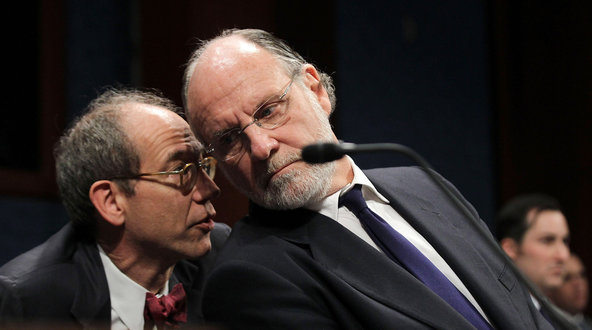 Alex Wong/Getty ImagesJon S. Corzine, right, MF Global’s former chief executive, consults with an aide during his testimony before a House hearing on his firm’s demise.
Alex Wong/Getty ImagesJon S. Corzine, right, MF Global’s former chief executive, consults with an aide during his testimony before a House hearing on his firm’s demise.
WASHINGTON — Jon S. Corzine, the former chief executive of MF Global, on Thursday denied claims that he had known the brokerage firm was improperly tapping customer funds to stave off collapse.
Mr. Corzine told a House panel that he had received assurances, “both orally and in writing,” that the firm followed federal laws about keeping customer money separate from firm funds.
But some lawmakers suggested that MF Global might have breached those rules on Oct. 28, three days before it filed for bankruptcy. After the firm transferred about $175 million to JPMorgan Chase to shore up an overdrawn account, the bank contacted Mr. Corzine to ensure that the money was not customer cash, according to testimony Thursday by the former chief executive.
Mr. Corzine told lawmakers that a back-office employee in MF Global’s Chicago headquarters had affirmed that the funds came from the firm and not customers.
“I don’t know of any loan that was backed by customer funds,” Mr. Corzine said on Thursday before the oversight subcommittee of the House Financial Services Committee. “I wouldn’t have authorized it.”
The hearing was the third appearance by Mr. Corzine — a former Democratic United States senator and a former governor of New Jersey — before a Congressional panel in just over a week. As in the previous hearings, lawmakers gained little insight on Thursday into the whereabouts of some $1 billion that vanished from MF Global. But the House committee did offer Mr. Corzine his first chance to rebut claims that he knew all along about some of the missing money.
His denials came in sharp contrast to testimony by Terrence Duffy, executive chairman of the CME Group, the exchange where MF Global did business. Mr. Duffy, testifying on Tuesday before a Senate committee, said that MF Global had used customer funds to lend from one arm of the firm to another — and that Mr. Corzine had been aware of it. Mr. Duffy repeated those accusations on Thursday before the House panel, saying “in our opinion, someone has violated the law here,” though he did not specify Mr. Corzine.
Mr. Corzine however, challenged Mr. Duffy’s assertion that he had been aware of the loans using customer money.
“I don’t know the source of the suggestion,” Mr. Corzine said, adding that he had first learned of the shortfall in customer funds late on Sunday, Oct. 30.
Mr. Duffy said only that a CME auditor had learned of the accusation in a conference call with “senior MF Global employees.”
But Representative Randy Neugebauer, a Republican from Texas and chairman of the House panel, said on Thursday that the unnamed executive was the chief financial officer of MF Global’s North American operations.
“Let’s be clear Mr. Corzine, this individual is a senior employee of your firm — a person you interact with regularly,” the congressman said. “Were you aware of loans made from customer accounts?
“As I have repeatedly stated, I was stunned on Sunday night,” Mr. Corzine said, referring to a conversation about 11 p.m. on Oct. 30, when he said he learned that the firm was missing about $1 billion in customer money.
Yet other MF Global executives were aware of the shortfall about five hours earlier, according to documents that CME submitted to lawmakers on Thursday.
About 6 p.m. that day, the firm’s general counsel notified CME that there was an apparent shortfall. But the counsel, Laurie Ferber, blamed an accounting error, according to CME.
At about 10 p.m., MF Global still held that the shortfall must be an accounting error, telling CME that the amount of money in question was “too big to be anything else.” Around midnight, Ms. Ferber sent an e-mail to CME saying “we may have it.”
But by 2 a.m., those hopes were dashed.
Mr. Neugebauer, citing information from CME, described an early morning meeting that day, when two MF Global executives told a CME official at the firm’s offices that as much as $700 million in customer funds had been transferred for the purposes of the firm. Such a move would have been intended to meet MF Global’s liquidity needs.
“If true, this is the first acknowledgment from officers of your firm that customer segregated accounts were in fact raided,” the committee chairman said.
But Mr. Corzine, who was not present at the time, appeared unfamiliar with that particular meeting.
“I’m aware of a phone call with regulators on the 31st,” he said. “I am not aware that we used the terms that you used.”
Much of the remainder of the marathon hearing, which lasted more than five hours, centered on the missing money and who was to blame for MF Global’s collapse. House members took turns posing harsh, sometimes-arcane questions to Mr. Corzine and Bradley Abelow, the firm’s chief operating officer. In response, the men responded with variations of “I don’t know.”
The dispute often got testy, as Republican lawmakers grew impatient with Mr. Corzine.
At one point, Representative Steve Pearce, Republican of New Mexico, wondered aloud what it would take for staff members at MF Global to bring information to Mr. Corzine.
“When do they have to come to you?” he asked. “Your day-to-day knowledge is not very thorough.”
Another congressman asked about a document issued by the company on Nov. 7, a week after its bankruptcy, suggesting there were no fund imbalances at MF Global.
Mr. Corzine indicated that following the bankruptcy and his resignation, he was no longer privy to such information.
Clearly miffed, the congressman muttered “slippery when dry” before ceding the floor.
Ben Protess reported from Washington and Azam Ahmed from New York.
Article source: http://feeds.nytimes.com/click.phdo?i=9aa3ec7344ae26f0998214bbf25d4fd3
